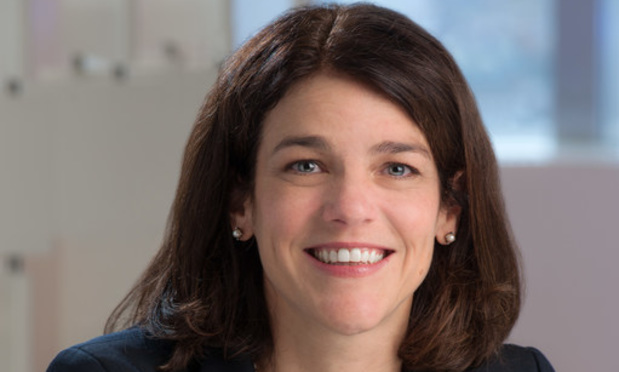Ropes names first-ever female chair as London partner takes new role as global finance co-head
Firm appoints corporate partner as next firmwide leader following string of recent exits
November 20, 2017 at 06:46 AM
6 minute read
The original version of this story was published on Law.com
Ropes & Gray has selected corporate partner Julie Jones to become the firm's first-ever female chair after the retirement of long-serving leader Bradford Malt at the end of 2019.
The change will not take effect until 2020, but when it does, Jones, 48, will join a select number of women at the top levels of leadership at major international law firms. She will also become the first woman to hold the chair position in Ropes' 150-year history.
The leadership transition coincides with Malt reaching the firm's mandatory retirement age of 65 at the end of 2019. The firm's policy committee, which acts as its governing board, selected Jones as the firm's next chair after conducting one-on-one consultations with all of the firm's partners, according to Malt and Ropes managing partner David Chapin.
Chapin is due to retire at the end of 2019, and he said a similar process would take place next year to determine his successor as managing partner.
Jones is not the only female partner moving up in Ropes' leadership. London finance partner Jane Rogers has been appointed to the firm's policy committee, with fellow City partner Mike Kazakevich taking over her role as global co-head of finance, working in tandem with fellow co-head Byung Choi, who is based in Boston.
Rogers is the sole London partner to have a position on the policy committee and becomes the third woman on the committee, alongside Jones and New York litigation partner Joan McPhee.
The firm has seen a stream of global departures in recent months, with more than 20 partners leaving since the start of the year, including seven moving to Kirkland & Ellis in London, Hong Kong, New York, Chicago and Boston.
Seven of the departures have been in London, with partners leaving for firms including Dechert, King & Spalding, White & Case and Linklaters. The firm has been offering associates retention bonuses of up to $50,000 (£37,500) to prevent further exits.
Despite widespread rumours of management tensions and dissatisfaction around pay, Ropes' leadership has been keen to stress that the firm is having a good year and that most of the exits are not bad news for the firm.
Malt, who has been Ropes chair since 2004, said in an interview with Legal Week sister title The American Lawyer that there was "stunning unanimity" among partners that Jones was the right fit as the firm's next chair.
"For someone who has been a lifer at this firm," he said, "I just couldn't feel more confident knowing that the firm will be in Julie's hands. We've been turning to Julie for some of our most thorny issues for some time now."
While she is now chair-elect and poised to become the firm's top leader, Jones has long held leadership roles at the firm. From 2006-11, she was head of its securities and public companies group and, since then, has served as a member of Ropes' policy committee.
Starting at the firm in 1994, Jones made partner in 2003 and has built a reputation over the years as a top dealmaker for private equity clients. Based in Boston, but also working out of New York, she has had a hand in transactions across a host of industries, including a recent role advising TPG Capital in a reported $2bn sale of hospital chain IASIS Healthcare to Steward Health Care System.
Jones had a particularly active year in 2010, when she represented TPG Capital in a $3bn acquisition of clothing retailer J Crew Group, guided Thomas H Lee Partners toward its $1.1bn acquisition of biotechnology company inVentiv Health, and advised on an initial public offering by brokerage firm LPL Financial. That year she was also part of a Ropes team that represented Bain Capital in its $1.8bn acquisition of children's clothier Gymboree.
Jones said she expects that once she formally becomes chair in 2020, that role will take up the vast majority of her time. But she stressed that she will not be walking away from clients altogether.
"I can't imagine a world in which I'm not there to support clients in moments of significant judgement," she said.
In the interim two years, Jones is expected to work closely to help guide the firm's direction alongside Malt, Chapin, the firm's policy committee and its partners in the US, London and Asia. Chapin, Malt and Jones all said they do not expect any major strategic shifts in the short term. They also explained that the firm decided to announce the leadership change well in advance to provide ample time to undertake the transition.
"The transition has been underway – in the planning stages – for a while," Chapin said.
The firm's leadership announcement comes toward the end of a year that has seen personnel shake-ups at Ropes, which saw a number of partners depart in 2017 and which completed a spinoff of its patent prosecution group. Those developments, however, did not play any role in the firm's plans for a transition of leadership, according to Malt, who described them as "the kinds of strategic decisions that well-managed firms make."
Looking ahead, Jones said she expects to spend the next couple of years reaching out to partners and the firm's clients to "spend time thinking together about where they want the future of Ropes to be."
She also reflected on her rise to the top of the firm's leadership as a woman – something that remains rare in the world of Big Law. Jones said she views her leadership role as both an honour and a testament to the values that Ropes & Gray maintains as a firm.
"I was always judged on merit. We value intelligence, hard work and commitment – and those things are gender-blind," she said. "I feel lucky because of the values Ropes has as a firm, and because we've always had strong women leaders and I benefited from that. I feel a sense of duty in that regard. I need to continue to demonstrate our commitment to those core values."
NOT FOR REPRINT
© 2025 ALM Global, LLC, All Rights Reserved. Request academic re-use from www.copyright.com. All other uses, submit a request to [email protected]. For more information visit Asset & Logo Licensing.
You Might Like
View All

Demand Growth to 'Likely Weaken' in 2025 After 'Anomalies' Propelled Big Law Profits in 2024
5 minute readTrending Stories
- 1Many LA County Law Firms Remain Open, Mobilize to Support Affected Employees Amid Historic Firestorm
- 2Stevens & Lee Names New Delaware Shareholder
- 3U.S. Supreme Court Denies Trump Effort to Halt Sentencing
- 4From CLO to President: Kevin Boon Takes the Helm at Mysten Labs
- 5How Law Schools Fared on California's July 2024 Bar Exam
Who Got The Work
Michael G. Bongiorno, Andrew Scott Dulberg and Elizabeth E. Driscoll from Wilmer Cutler Pickering Hale and Dorr have stepped in to represent Symbotic Inc., an A.I.-enabled technology platform that focuses on increasing supply chain efficiency, and other defendants in a pending shareholder derivative lawsuit. The case, filed Oct. 2 in Massachusetts District Court by the Brown Law Firm on behalf of Stephen Austen, accuses certain officers and directors of misleading investors in regard to Symbotic's potential for margin growth by failing to disclose that the company was not equipped to timely deploy its systems or manage expenses through project delays. The case, assigned to U.S. District Judge Nathaniel M. Gorton, is 1:24-cv-12522, Austen v. Cohen et al.
Who Got The Work
Edmund Polubinski and Marie Killmond of Davis Polk & Wardwell have entered appearances for data platform software development company MongoDB and other defendants in a pending shareholder derivative lawsuit. The action, filed Oct. 7 in New York Southern District Court by the Brown Law Firm, accuses the company's directors and/or officers of falsely expressing confidence in the company’s restructuring of its sales incentive plan and downplaying the severity of decreases in its upfront commitments. The case is 1:24-cv-07594, Roy v. Ittycheria et al.
Who Got The Work
Amy O. Bruchs and Kurt F. Ellison of Michael Best & Friedrich have entered appearances for Epic Systems Corp. in a pending employment discrimination lawsuit. The suit was filed Sept. 7 in Wisconsin Western District Court by Levine Eisberner LLC and Siri & Glimstad on behalf of a project manager who claims that he was wrongfully terminated after applying for a religious exemption to the defendant's COVID-19 vaccine mandate. The case, assigned to U.S. Magistrate Judge Anita Marie Boor, is 3:24-cv-00630, Secker, Nathan v. Epic Systems Corporation.
Who Got The Work
David X. Sullivan, Thomas J. Finn and Gregory A. Hall from McCarter & English have entered appearances for Sunrun Installation Services in a pending civil rights lawsuit. The complaint was filed Sept. 4 in Connecticut District Court by attorney Robert M. Berke on behalf of former employee George Edward Steins, who was arrested and charged with employing an unregistered home improvement salesperson. The complaint alleges that had Sunrun informed the Connecticut Department of Consumer Protection that the plaintiff's employment had ended in 2017 and that he no longer held Sunrun's home improvement contractor license, he would not have been hit with charges, which were dismissed in May 2024. The case, assigned to U.S. District Judge Jeffrey A. Meyer, is 3:24-cv-01423, Steins v. Sunrun, Inc. et al.
Who Got The Work
Greenberg Traurig shareholder Joshua L. Raskin has entered an appearance for boohoo.com UK Ltd. in a pending patent infringement lawsuit. The suit, filed Sept. 3 in Texas Eastern District Court by Rozier Hardt McDonough on behalf of Alto Dynamics, asserts five patents related to an online shopping platform. The case, assigned to U.S. District Judge Rodney Gilstrap, is 2:24-cv-00719, Alto Dynamics, LLC v. boohoo.com UK Limited.
Featured Firms
Law Offices of Gary Martin Hays & Associates, P.C.
(470) 294-1674
Law Offices of Mark E. Salomone
(857) 444-6468
Smith & Hassler
(713) 739-1250











